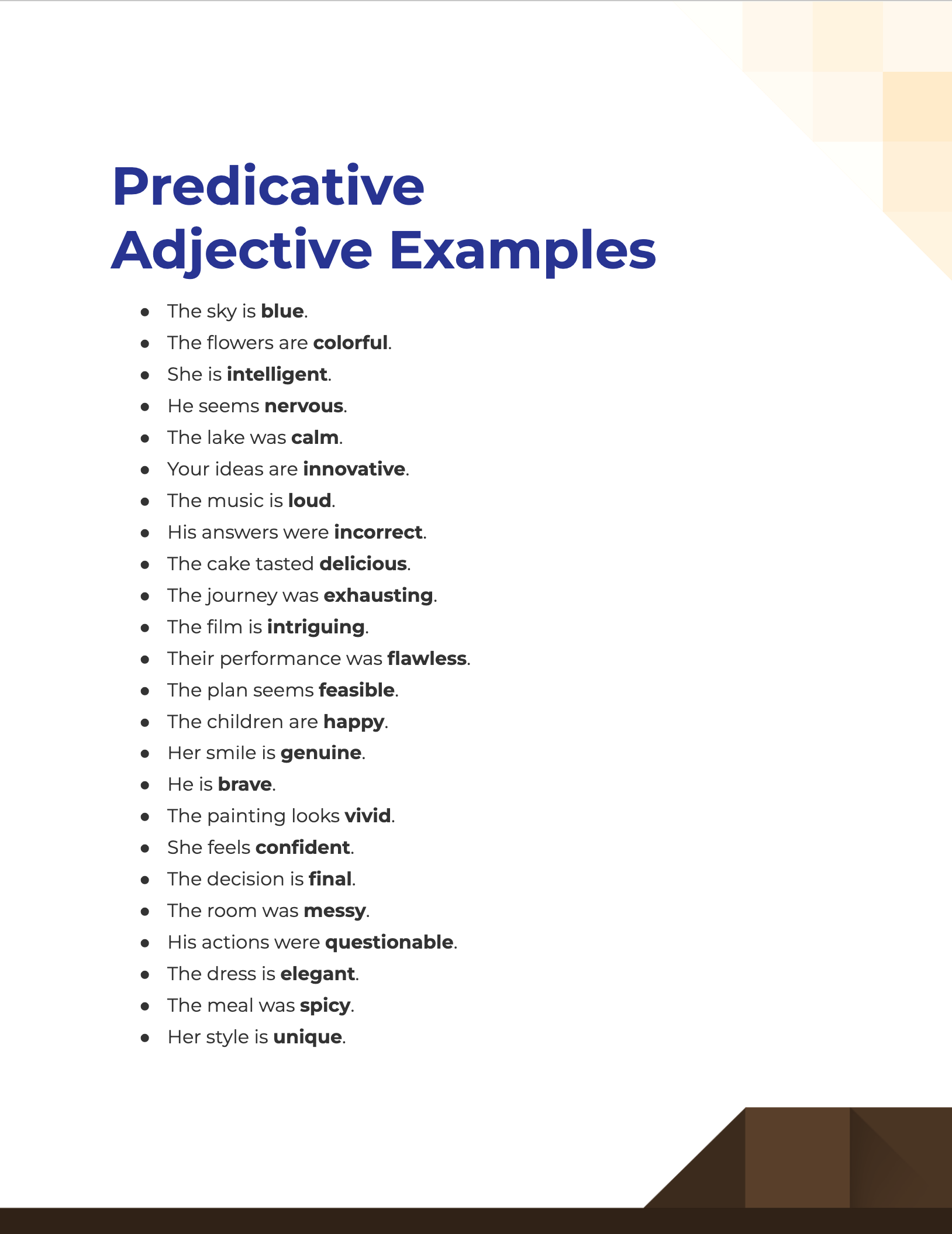99+ Predicative Adjective Examples
Master the art of using predicative adjectives and enrich your sentences. Unlock a new level of eloquence by understanding how these adjectives function. This guide is your one-stop resource for tips and examples to help you use predicative adjectives like a pro.
What is the Predicative Adjective? – Definition
A predicative adjective is a type of adjective that comes after a linking verb and describes the subject of the sentence. Unlike attributive adjectives, which appear directly before the noun they describe, predicative adjectives are separated from the noun by a linking verb like “is,” “am,” or “are.”
What is the Best Example of a Predicative Adjective?
For a clear understanding of a predicative adjective, let’s look at this sentence: “The cake is delicious.” In this case, “delicious” is the predicative adjective as it describes the subject “cake,” coming after the linking verb “is.” This structure provides a simple yet effective way to convey an attribute of the subject without altering the basic structure of the sentence.
100 Predicative Adjective Examples

Want to become an expert in using predicative adjectives? Dive into these handpicked examples designed to enrich your understanding of this grammatical component. From simple to complex, this comprehensive list of 100 unique predicative adjectives will skyrocket your writing skills to the next level.
- The sky is blue.
- The flowers are colorful.
- She is intelligent.
- He seems nervous.
- The lake was calm.
- Your ideas are innovative.
- The music is loud.
- His answers were incorrect.
- The cake tasted delicious.
- The journey was exhausting.
- The film is intriguing.
- Their performance was flawless.
- The plan seems feasible.
- The children are happy.
- Her smile is genuine.
- He is brave.
- The painting looks vivid.
- She feels confident.
- The decision is final.
- The room was messy.
- His actions were questionable.
- The dress is elegant.
- The meal was spicy.
- Her style is unique.
- The wine is sweet.
- They are reliable.
- The story became complicated.
- The car is new.
- The restaurant is expensive.
- She is thoughtful.
- He is creative.
- Their approach was strategic.
- The machine is functional.
- The process is streamlined.
- The product is eco-friendly.
- You are incorrect.
- The project is ambitious.
- The book was interesting.
- The speech was inspiring.
- The garden looks beautiful.
- The team is motivated.
- The path was steep.
- She is athletic.
- The view is stunning.
- The cat is lazy.
- The solution is practical.
- The data is inconclusive.
- He became defensive.
- The situation is dire.
- She is sincere.
- The coffee is strong.
- The fabric feels soft.
- The concert was enjoyable.
- The play was emotional.
- The market is volatile.
- The test was difficult.
- His face turned red.
- He is humorous.
- The game was intense.
- The atmosphere is relaxed.
- The couple seems content.
- Her writing is poetic.
- The argument was convincing.
- His style is minimalistic.
- The offer is generous.
- She is skilled.
- The report is accurate.
- The apples are ripe.
- The seminar was educational.
- The lyrics are meaningful.
- The weather is hot.
- The challenge is daunting.
- He is boring.
- She was hopeful.
- The water is cold.
- The dog is friendly.
- The location is remote.
- The news is surprising.
- He was grateful.
- The technology is advanced.
- The child is curious.
- She is ambitious.
- The exercise is simple.
- They are independent.
- The subject is complex.
- The painting is abstract.
- The mountain is high.
- The sea was rough.
- The show was entertaining.
- The city is busy.
- The advice is sound.
- The course was informative.
- The fruit is juicy.
- The lesson was valuable.
- He is pessimistic.
- The exam was easy.
- The device is portable.
- Her answer was correct.
- The presentation was professional.
- The cake is moist.
Predicative Adjective Examples for Class 2
Here are 10 child-friendly, unique sentence examples showcasing the use of predicative adjectives, tailored for Class 2 students:
- The sun is bright.
- The cat is fluffy.
- My book is new.
- The tree is tall.
- Her dress is pink.
- The clown is funny.
- The pizza was yummy.
- The slide is fast.
- The dog is cute.
- The stars are shiny.
Predicative Adjective Examples for Class 3
For Class 3 students who are a bit more advanced, here are 10 unique sentence examples:
- The elephant is huge.
- His solution was clever.
- The painting is colorful.
- The quiz was easy.
- My teacher is kind.
- The game was exciting.
- The movie is scary.
- The plant is healthy.
- Her idea is original.
- The bird is noisy.
How do you identify a predicative adjective?
Understanding how to identify a predicative adjective is essential for grasping the subtleties of sentence construction. A predicative adjective is typically positioned after a linking verb and describes the subject of the sentence. Linking verbs often include forms of “to be,” such as “is,” “am,” “are,” “was,” and “were.” However, other verbs like “seem,” “become,” “appear,” and “feel” can also function as linking verbs.
Key Identifiers for Predicative Adjectives:
- Position: Comes after a linking verb and relates back to the subject.
- Linking Verb: Look for linking verbs like “is,” “are,” “was,” “were,” “seem,” and “become.”
- Subject Complement: It must refer back to the subject, offering more information about it.
Steps to Identify a Predicative Adjective:
- Locate the Subject: Identify the subject of the sentence.
- Find the Verb: Look for the verb and decide if it’s a linking verb.
- Spot the Adjective: If an adjective follows the linking verb and describes the subject, it’s predicative.
Example: In the sentence “The sky is blue,” “blue” is the predicative adjective as it follows the linking verb “is” and describes the subject “sky.”
What are predicate words?
Predicate words are essential components that offer information about the subject in a sentence. They complete the meaning initiated by the subject and can be verbs, adjectives, or nouns. Predicate words usually follow the subject and contain the verb along with its complements, objects, and modifiers.
Types of Predicate Words:
- Predicate Nouns: Nouns that follow a linking verb and rename the subject.
- Predicate Adjectives: Adjectives that follow a linking verb and describe the subject.
- Predicate Verbs: The action verb along with its complements and modifiers.
Examples:
- Predicate Noun: She is a teacher.
- Predicate Adjective: The dog is lazy.
- Predicate Verb: She runs fast.
What is an example of a predicative position?
A predicative position in a sentence is typically occupied by predicate nouns or predicate adjectives that follow a linking verb. These elements in the predicative position provide additional information about the subject and complete the sentence’s meaning.
Examples of Predicative Position:
- Predicative Noun Example: In “My father is an engineer,” “an engineer” occupies the predicative position.
- Predicative Adjective Example: In “The coffee is hot,” “hot” takes the predicative position after the linking verb “is,” describing the subject “coffee.”
Understanding the predicative position is crucial for sentence clarity and effectiveness. It provides a structured way to offer more information about the subject, enhancing both written and spoken language.
What is a predicate adjective verb phrase?
A predicate adjective verb phrase is a phrase that includes a linking verb followed by a predicative adjective, along with any accompanying adverbs or other modifiers. The entire phrase serves to describe or provide more information about the subject of the sentence. Unlike typical verb phrases that show action, these phrases provide descriptive qualities related to the subject.
Structure:
- [Linking Verb] + [Predicative Adjective] + [Adverb or Other Modifiers]
Examples:
- The cat is extremely lazy.
- The coffee smells incredibly strong.
- She seems quite happy today.
In these examples, the phrases “is extremely lazy,” “smells incredibly strong,” and “seems quite happy” are predicate adjective verb phrases. They consist of a linking verb (“is,” “smells,” “seems”) followed by a predicative adjective (“lazy,” “strong,” “happy”) and an accompanying adverb (“extremely,” “incredibly,” “quite”).
How to Use a Predicative Adjective? – Step by Step Guide
Using a predicative adjective effectively can add clarity and nuance to your sentences. Here’s a step-by-step guide to help you utilize them accurately:
- Identify the Subject: Determine what or who the sentence is about.
- Choose a Linking Verb: Use a linking verb suitable for your sentence, like “is,” “are,” “become,” or “seem.”
- Select a Suitable Adjective: Pick an adjective that appropriately describes or relates to the subject.
- Combine Them: Form a sentence by putting the subject, linking verb, and predicative adjective together.
- Add Modifiers: If needed, use adverbs to further describe the adjective.
Example:
- Subject: The movie
- Linking Verb: was
- Predicative Adjective: amazing
- Combined: The movie was amazing.
- With Modifier: The movie was absolutely amazing.
Tips for Using Predicative Adjective
- Be Precise: Choose the most accurate adjective to convey your meaning clearly.
- Avoid Redundancy: Don’t use unnecessary words that don’t add value. Keep it concise.
- Use Adverbs Sparingly: While adverbs can enhance meaning, overuse can make the sentence cumbersome.
- Maintain Agreement: Ensure that the subject and the linking verb are in agreement (singular/plural).
- Context Matters: Always consider the context to select the most fitting predicative adjective.
- Keep Tenses Consistent: Make sure the tense of the linking verb aligns with the overall tense of your writing.
- Test the Sentence: Remove the adjective and the linking verb. If the sentence loses significant meaning, you’ve used the predicative adjective correctly.
By understanding the function and structure of predicative adjectives and predicate adjective verb phrases, you can make your sentences more meaningful and impactful.



